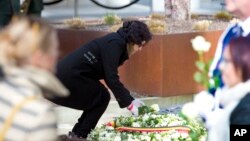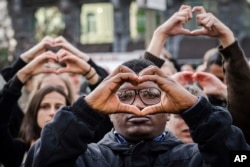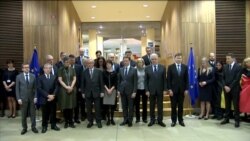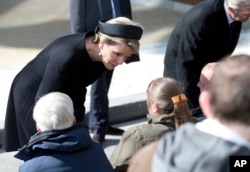Ceremonies were held Wednesday in Brussels to mark the one-year anniversary of the terror attacks in the city, which killed 32 people and came just four months after the series of attacks that took 130 lives in the French capital, Paris.
The remembrance services in the political heart of Europe took place amid a fierce debate over security failings that allowed the assailants to travel freely into and within the European Union.
“There were significant lessons to be learned both from Brussels and Paris, and more recently from Berlin. And that is really about how good the border agencies in those countries, and all the agencies, are collaborating with each other, to share intelligence in order to intercept harmful people at the border,” said Tony Smith, former director general of Britain's Border Force.
Leaked report cites poor communication
A March report written by the European Commission's security union task force, and leaked to Britain's Guardian newspaper, warns that security services are unable to carry out basic checks, like searching cross-national databases using biometric data such as fingerprints.
The alleged mastermind of the Paris attacks in 2015, Abdelhamid Abaaoud, was the subject of an international arrest warrant, yet was able to travel from Belgium to Syria via Egypt in 2013 before returning to Europe.
Anis Amri — an asylum seeker who drove a truck into a Berlin Christmas market in December and killed 12 people — entered Germany from Italy via Switzerland, despite appearing on a terror suspect list.
Watch: Brussels Marks Attacks Anniversary as Debate Rages Over Security Failings
“So when you're looking at controlling people who are crossing the external frontier [of the EU], some of whom are European passport holders, the officers there aren't getting the tools, the information and the data they need. With the free movement within the EU, it's very easy to move around the EU with weapons, quite often undocumented,” said Smith.
The leaked EU report suggests officials are considering beefing up police checks within the passport-free Schengen zone — but there is political opposition. Swedish member of the European Parliament Malin Bjork was in the Brussels airport when the bombers struck a year ago.
“I think we are going the wrong way. So there is all this emphasis on militarized and surveillance-based security, and I think it's inefficient and I think it's not long-term at all,” said Bjork.
Mayor claims improved security
Many of the Brussels and Paris suspects lived in or operated from the Molenbeek district of Brussels. Belgian media reported Monday that police have uncovered 51 organizations there with suspected ties to terrorism. Molenbeek Mayor Francoise Schepmans says the flow of Belgian citizens to join Islamic State has been halted.
“We see that there are no longer any departures for Syria and that there are few returnees. The problem centers on people who are here in the municipality, and we keep an eye on these people.”
Security experts say the current border systems are failing to tackle that homegrown terror threat; but, in Europe, there remains strong political support for freedom of movement, seen as one of the pillars of the EU.








